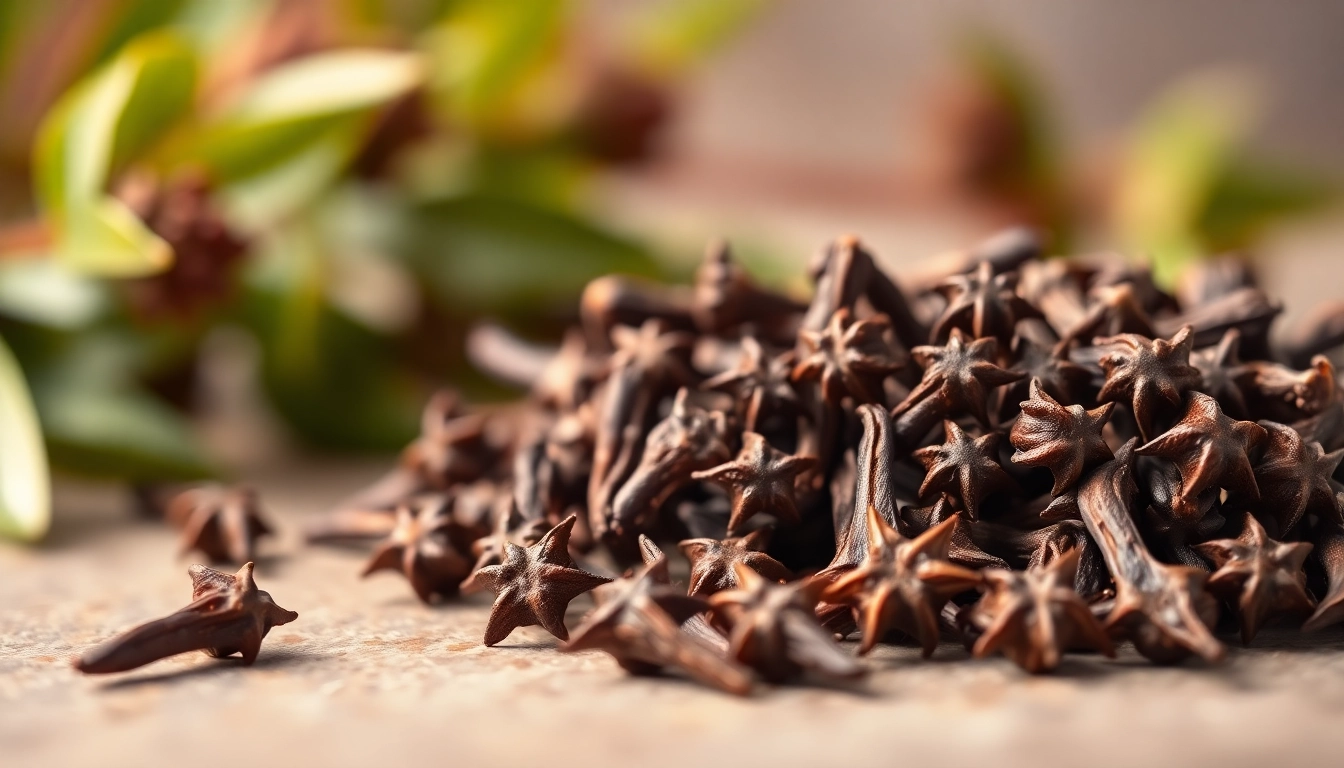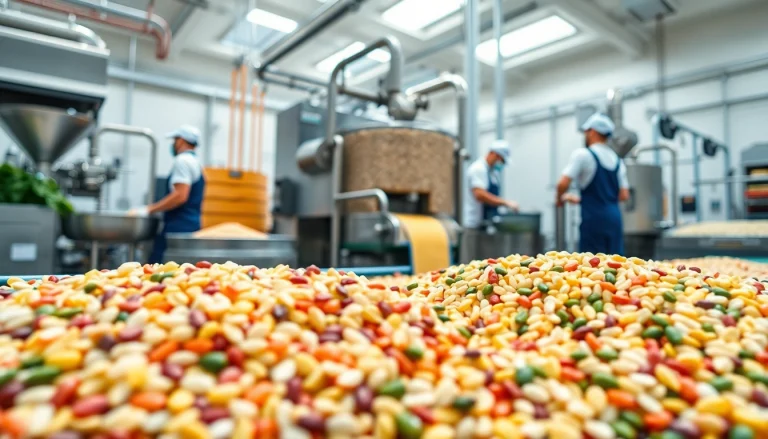Understanding Cloves: Origins and Characteristics
What are Cloves?
Cloves are the aromatic flower buds of a tree in the family Myrtaceae, known scientifically as Syzygium aromaticum. These small, dried flower buds exhibit a unique, robust flavor and aroma that make them a popular spice across the globe. Found in various culinary traditions, cloves can add warmth and depth to sweet and savory dishes alike. Furthermore, cloves are not only valued for their flavor but also for their medicinal properties, making them a powerful component in both kitchens and medicine cabinets. To explore high-quality options for incorporating cloves into your culinary creations, consider checking out Cloves.
History and Cultural Significance of Cloves
The history of cloves dates back thousands of years. Indigenous to the Maluku Islands, also known as the Spice Islands of Indonesia, cloves were highly sought after in ancient trade routes. Their rarity and value led to a thriving economy around this single spice. By the 4th century, cloves had made their way to China, and by the 9th century, they were being utilized in Indian cooking and medicine.
Across cultures, cloves have held significant roles. In the Middle Ages, they were used as a preservative for meats and as a means to mask the unpleasant odors of food that had begun to spoil. They found their way into various traditional medicines as an essential component believed to possess healing properties. Today, cloves continue to play a substantial role in wedding ceremonies and cultural rituals, particularly in South Asia and parts of Africa.
Botanical Classification of Cloves
Botanically, cloves belong to the genus Syzygium, within the family Myrtaceae. The tree itself can grow up to 8-12 meters tall, characterized by its large, green leaves and clusters of aromatic flower buds. Syzygium aromaticum thrives in tropical climates and requires well-draining, fertile soils to flourish. The tree is evergreen, and its buds are harvested before they bloom, producing the unique clove spice we know today. The complex aroma and flavor profile of cloves result from the presence of numerous chemical compounds, with eugenol being the most notable for its distinct fragrance.
Health Benefits of Cloves
Essential Nutrients Found in Cloves
Cloves are not merely a flavoring agent; they also boast an impressive nutritional profile. Rich in vitamins and minerals, cloves contain several essential nutrients, including manganese, vitamin K, and fiber. Manganese is crucial for bone health, metabolism, and antioxidant defense. Moreover, the vitamins found in cloves contribute to overall bodily functions, including blood clotting and immune response.
Cloves as a Natural Antioxidant
One of the standout qualities of cloves is their high antioxidant content. Antioxidants are compounds that help neutralize harmful free radicals in the body. Free radicals can cause oxidative stress, leading to cellular damage and various chronic diseases, including cancer and heart disease. Cloves are particularly high in eugenol, which has been linked to considerable antioxidant activity, thereby potentially reducing the risk of these diseases and promoting overall health.
Potential Medicinal Uses of Cloves
The medicinal applications of cloves trace back centuries, as various cultures have harnessed their properties for holistic health. One popular use is for dental health; clove oil, derived from the buds, acts as a natural analgesic and antiseptic, often utilized for toothaches and gum inflammation. Additionally, cloves may aid digestion and alleviate nausea, particularly when consumed in tea. Recent studies indicate that extracts from cloves may help in managing liver health and offer anti-inflammatory effects, supporting the body’s natural healing processes.
Using Cloves in Cooking and Beyond
Popular Culinary Applications of Cloves
In culinary practices worldwide, cloves serve as a potent ingredient. They are integral in spice blends such as garam masala and are often found in baked goods, providing a warm depth of flavor. Cloves are commonly used in dishes like spiced rice, curries, and marinades, enhancing both savory entrees and desserts. Their bold flavor allows them to complement rich meats and fragrant stews splendidly.
Creative Ways to Incorporate Cloves in Your Diet
In addition to traditional culinary uses, there are innovative ways to enjoy the unique taste of cloves. Here are several ideas:
- Clove-Infused Oils: Create your own infused oil by steeping whole cloves in olive oil for a few days. Use this aromatic oil for drizzling over salads or as a dip with bread.
- Homemade Spice Mixes: Blend ground cloves into homemade spice mixtures for baking or seasoning meats. Their flavor pairs well with cinnamon and nutmeg.
- Clove Tea: Brew a soothing tea by steeping whole cloves in hot water. This delightful drink can be enhanced with honey and lemon for added health benefits.
- Clove-Studded Fruits: Enhance the presentation and flavor of fruits like oranges by studding them with whole cloves for a decorative touch and an infusion of aroma.
Clove Oil: Uses and Precautions
Clove oil is a concentrated extract that possesses many of the same properties as whole cloves. While it has numerous applications, including aromatherapy and natural remedies, it should be used cautiously. It is potent and should be diluted with a carrier oil before applying to the skin to prevent irritation. Pregnant women and individuals on blood-thinning medications should consult with healthcare professionals before using clove oil, as its blood-thinning properties may pose risks.
Buying and Storing Cloves
How to Choose Quality Whole Cloves
When purchasing cloves, it’s essential to look for high-quality products to ensure maximum flavor and health benefits. Whole cloves should be dark brown and firm to the touch, with an intense aroma. Avoid cloves that are dusty or lack fragrance, as these may be old or of inferior quality. Opt for reputable brands and organic sources whenever possible, particularly if you’re using cloves for medicinal purposes.
Best Storage Practices for Freshness
The longevity of cloves largely depends on how they are stored. To retain their flavor, it’s best to keep whole cloves in an airtight container in a cool, dark place, away from direct sunlight. Ground cloves, on the other hand, tend to lose their potency more quickly and should be stored similarly but used within six months for optimal freshness. If you buy in bulk, consider vacuum sealing portions to preserve their flavor over longer periods.
Common Mistakes When Using Cloves
Using cloves in cooking or medicine can be straightforward, but several common mistakes may diminish their effectiveness. Some of these include:
- Neglecting to Freshen Spices: Always check the freshness of your cloves before use. Old spices can lack flavor.
- Overusing Cloves: Their strong flavor can easily overpower a dish. Use cloves judiciously for balance.
- Using Ground Instead of Whole: Whole cloves tend to be more aromatic and flavorful than ground cloves. Use whole cloves when you can and grind them fresh when needed.
Exploring Clove Varieties and Their Unique Flavors
Comparing Different Clove Types
While Syzygium aromaticum dominates the spice market, there are other varieties of cloves that offer different flavor profiles and characteristics, such as:
- Indonesian Cloves: Often considered the finest quality, Indonesian cloves have a balanced flavor profile with a slight sweetness, ideal for cooking.
- Malagasy Cloves: Grown primarily in Madagascar, these cloves have a robust and slightly bitter taste, making them suited for rich dishes.
- Comorian Cloves: Recognized for their intense aroma and strong flavor, Comorian cloves are usually used in traditional medicine and cooking.
Regional Differences in Clove Flavor Profiles
Geographical growing conditions significantly influence the flavor of cloves. Variations in soil, climate, and cultivation practices lead to distinctive taste profiles. For instance, cloves from Sri Lanka are often sweeter, making them preferable for baking, while those from Indonesia might be more pungent, suited for curries and marinades. Understanding these regional differences can enhance your ability to pair cloves correctly with specific dishes.
Culinary Techniques to Enhance Clove Flavor
To optimize the use of cloves in your cooking, consider employing several culinary techniques:
- Toasting: Lightly toasting whole cloves in a dry skillet for a few minutes can enhance their flavor and aroma, making them even more potent when added to recipes.
- Infusion: Infuse cloves in liquids, such as stocks, broths, or marinades, to extract their essence more thoroughly, enriching the overall flavor of the dish.
- Pairing with Complementary Flavors: Cloves work wonderfully with citrus, vanilla, and spices like cinnamon and nutmeg, creating complex and inviting flavor profiles in desserts and meats.























+ There are no comments
Add yours